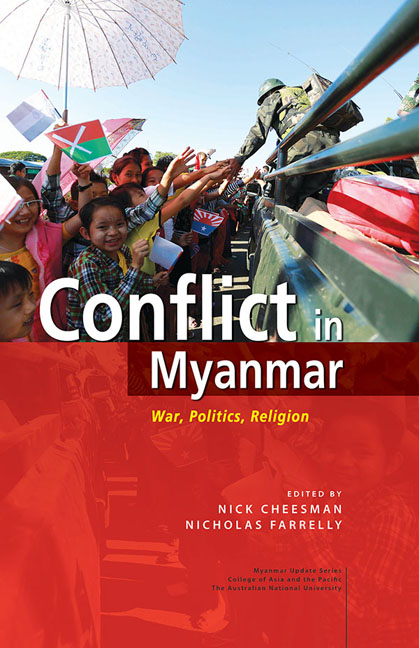Book contents
- Frontmatter
- Contents
- List of Maps
- List of Tables
- List of Figures
- Acknowledgements
- Contributors and Editors
- Part I Introduction
- Part II War and Order
- Part III Elections and After
- 7 The 2015 elections and conflict dynamics in Myanmar
- 8 Institutions in Myanmar's 2015 election: The election commission, international agencies, and the military
- 9 Ethnicity and Buddhist nationalism in the 2015 Rakhine State election results
- 10 The Hluttaw and conflicts in Myanmar
- 11 Legislating reform? Law and conflict in Myanmar
- Part IV Us and Them
- Part V Conclusion
- Abbreviations and Key Terms
- Index
7 - The 2015 elections and conflict dynamics in Myanmar
from Part III - Elections and After
Published online by Cambridge University Press: 22 July 2017
- Frontmatter
- Contents
- List of Maps
- List of Tables
- List of Figures
- Acknowledgements
- Contributors and Editors
- Part I Introduction
- Part II War and Order
- Part III Elections and After
- 7 The 2015 elections and conflict dynamics in Myanmar
- 8 Institutions in Myanmar's 2015 election: The election commission, international agencies, and the military
- 9 Ethnicity and Buddhist nationalism in the 2015 Rakhine State election results
- 10 The Hluttaw and conflicts in Myanmar
- 11 Legislating reform? Law and conflict in Myanmar
- Part IV Us and Them
- Part V Conclusion
- Abbreviations and Key Terms
- Index
Summary
The watershed Myanmar 2015 elections are widely regarded as more credible and inclusive than any previous polls in the country, and were largely experienced as peaceful and without disruptions. Despite a mostly quiet election day, the electoral process, however, was not free of conflict. One major cluster of conflicts impacting the electoral process revolved around tensions between ethnic armed groups (EAGs) and the national government's military forces, the Tatmadaw — usually termed ‘ethnic conflict’ (see Laoutides and Ware, this volume). Another cluster of conflicts concerned the growing anti-Muslim sentiment, with the potential for violent escalation. A third conflict cluster evolved around questions of constitutional justice. This chapter briefly outlines the conceptual framework for elections and conflict, and then proceeds by reviewing the major clusters. The section on elections and the peace process is followed by a discussion of a little understood element of the electoral process, the partial cancellation of elections. The chapter concludes by summarizing some nascent conflict-mitigating measures of the 2015 electoral process and provides an outlook for challenges ahead.
ELECTORAL PROCESS AND RESULTS IN BRIEF
Despite low expectations based on historical experience and criticism in the period prior to 8 November 2015, the Union Election Commission (UEC) enabled a positive election-day experience for most of Myanmar's voters, and left little doubt that the will of the electorate was respected. The voter list, digitized and publicized for public scrutiny — which had been criticized for inconsistencies and omissions in earlier versions — stood its test on election day. More than a year prior to the polls the UEC engaged in unprecedented stakeholder meetings with political parties and CSOs. It introduced new integrity measures such as transparent ballot boxes, numbered seals, and indelible ink to create better safeguards in polling procedures, and supported the dissemination of voter education materials, including in the mass media and by new communication technologies. International and national observers were deployed in large numbers, all across the country and throughout the pre-election and election day period, with limitations only in conflict-affected areas and around military installations. Observers largely agreed in their assessments of an overall positive election day, while also sharing concerns about undemocratic restrictions in the electoral legal framework.
- Type
- Chapter
- Information
- Conflict in MyanmarWar, Politics, Religion, pp. 139 - 162Publisher: ISEAS–Yusof Ishak InstitutePrint publication year: 2016



